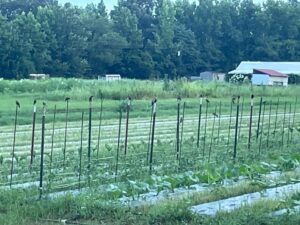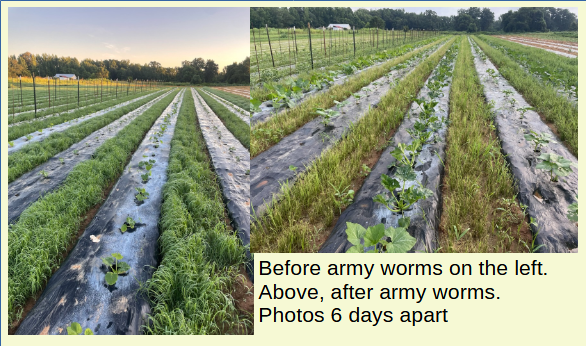Uninvited guests
I did not intend it to be dramatic foreshadowing when I ended the last newsletter by saying cover crops can sometimes cause problems. But on Saturday, driving onto the farm after my day at market, I noticed something was wrong with the teff grass. When I got out of the van to look I found it teeming with fall armyworms.
Fall armyworms are primarily a pest of hayfields because they love tender, well-fertilized grass. The moths overwinter further south and can arrive in large numbers, looking for the perfect spot to lay their eggs. The teff grass in the pathways was exactly what they were looking for. Their numbers increase with each generation, becoming the biggest potential problem in the fall after they have had multiple generations.

While they may prefer grass, they can destroy a tomato crop, as well and beets and brassicas. We know what we are dealing with because we have had armyworms before. The first time was several years ago in the fall. We noticed that the grass was gone, then they moved into the kale. Two years ago they took out a planting of Juliet tomatoes. We have some every year, and we have learned a thing or two about managing them. Their appearance this year concerns me because it is so early in the season for fall armyworms – still time for several more generations, and we’ve never anything like the scale of this infestation.
Today I went out to look and the caterpillars are mostly gone. Where? Into the soil to pupate, presumably. I had sprayed the teff grass with organic insecticides pyrethrum and azadirachtin on Saturday evening (oof, it was a long day!). The azadirachtrin, derived from the oil of the neem tree, inhibits the development of insects and should prevent the caterpillars from pupating. Hopefully the adults that emerge will fly off to greener pastures elsewhere. Meanwhile we will be keeping a sharp eye out. We’ve bought some pheromone traps to monitor the adult population.
A bird on every post
The birds do a great job keeping normal caterpillar populations in check. The posts are to support the tomato trellis but they make handy perches for our helpers as well. Unfortunately the sudden abundance of armyworms is too much for our feathered friends to manage alone.
Small Shares
- Red pontiac potatoes
- carrots
- candy onions
- bell/sweet peppers
- cherry tomatoes
Full shares
- Red pontiac potatoes
- carrots
- candy onions
- bell/sweet peppers
- cherry tomatoes
- slicing tomatoes
- squash and zucchini




You must be logged in to post a comment.